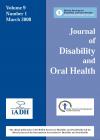Journal of Disability and Oral Health

- Cover Date:
- March 2008
- Print ISSN:
- 1470-8558
- Electronic ISSN:
- 1754-2758
- Vol:
- 9
- Issue:
- 1
Special Care Dentistry in daily practice
Professor Luc Martens, Belgium IADH President
Interview for FDI Worldental Daily Dubai 25 October 2007
Prof. Martens graduated from the University of Ghent in 1980 and completed his PhD there in 1987. He is the chairman of the Department of Paediatric Dentistry and Special Care at Ghent. He is the author of more than 75 international publications and supervised six PhD theses. He is the director of the Masters programme in Paediatric Dentistry and Special Care and the director of the PaeCaMed research group. Prof Martens is a founding member and Past President of the European Academy for Paediatric Dentistry (EAPD) and current President of the International Association of Disability and Oral Health (IADH). Recently he became appointed visiting professor in Special Care Dentistry at ACTA-Amsterdam, the Netherlands.
World Dental Daily (WDD): The IADH recently changed its name from the International Association of Dentistry for the Handicapped to the International Association for Disability and Oral Health. What was the reason? Prof. Luc Martens (LM): After years of discussion within the IADH Council the change of the name was finally decided in the year 2000. The main reason for it was on the one hand the strict meaning of the word ‘handicapped’, which has worldwide a pejorative sound and which is spontaneously related to mental retardation. The target group of IADH however, is a group of patients with special needs. This is far beyond the border of being handicapped. It deals with all patients with impairments, disabilities and finally handicaps (see next question). Furthermore, we decided to take after the United Nations and the World Health Organisation in their use the term disability in their policy documents. In addition, the term ‘dentistry’ became old fashion in modern health policies. Care for the whole oral sphere is important, not only teeth, therefore ‘oral health’ was introduced in place of dentistry. WDD: How do you define the term “disability†and what patient categories are included? LM: According to WHO, disabilities is an umbrella term, covering impairments, activity limitations, and participation restrictions. An impairment is a problem in body function or structure, while an activity limitation is a difficulty encountered by an individual in executing a task or action and finally, participation restriction, is a problem experienced by an individual in involvement in life situations.
- Article Price
- £15.00
- Institution Article Price
- £15.00
- Page Start
- 42
- Page End
- 43
- Authors
- Luc Martens
Articles from this issue
- Title
- Pg. Start
- Pg. End
- Extensive dental caries in unerupted permanent teeth of a disabled child with phenytoin-induced gingival overgrowth
- 13
- 16
- Current concepts in the pathogenesis and management of oral mucositis as a complication of cancer therapy
- 17
- 23
- Factors influencing the decision to perform dental treatment under general anaesthesia in children with intellectual disability
- 27
- 30
